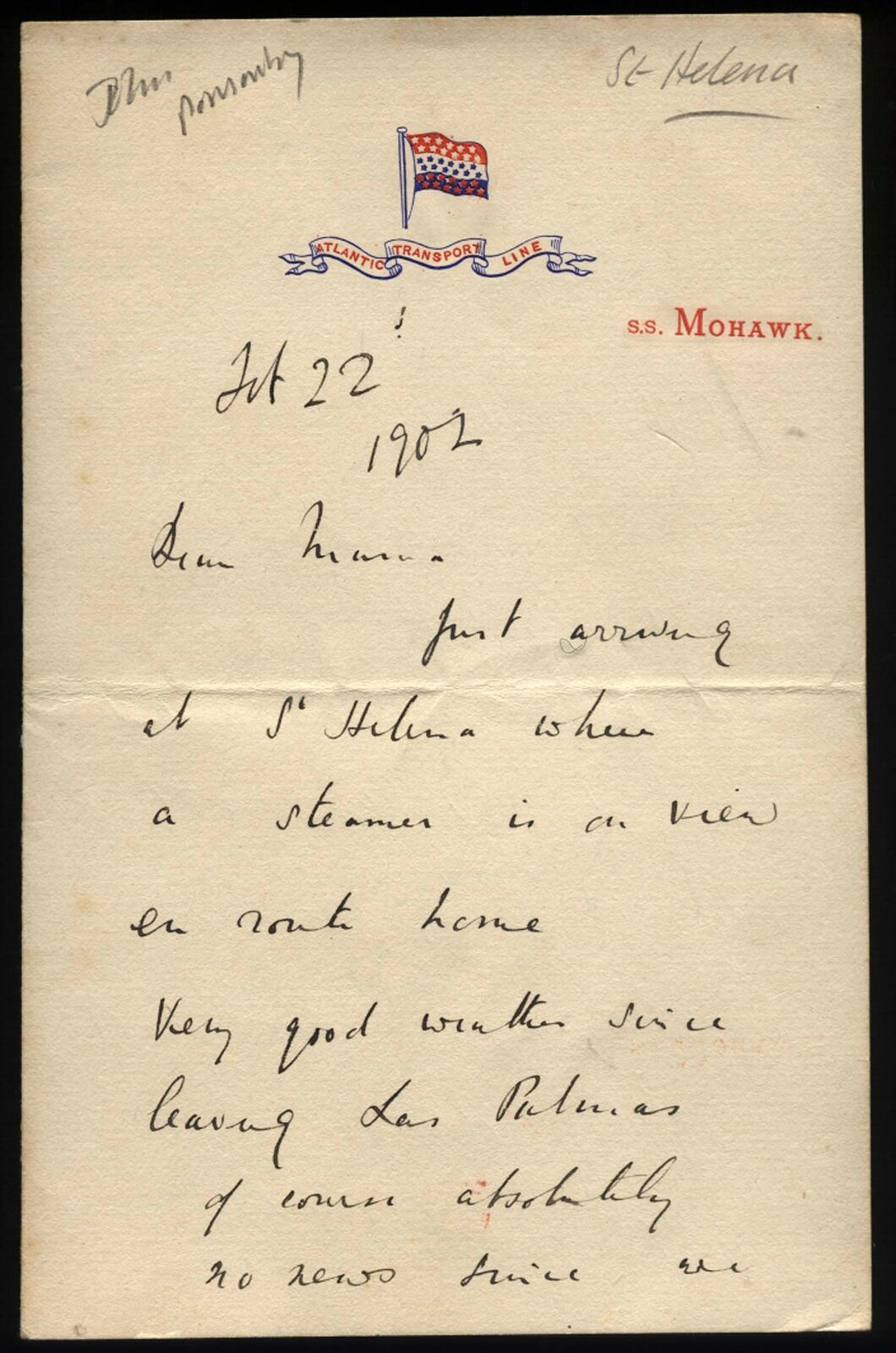-40%
1902 ST HELENA - S.s. MOHAWK - Capt. JOHN PONSONBY returning to service in Cape
$ 111.96
- Description
- Size Guide
Description
1902 ST HELENA - S.s. MOHAWK - Capt. JOHN PONSONBY returning to service in CapeThis product data sheet is originally written in English.
1902; Fine Letter from Captain John Ponsonby, Coldstream Guards, on board the MOHAWK & bound for his active service in the Cape Colony.
"S.S.Mohawk. Feb 22nd, 1902 Dear Mama, Just arriving at St Helena where a steamer is on view en route home.
Very good weather since leaving Las Palmas of course absolutely no news since we left Tilbury.
Bridge all day and night and as the boat is so crowded we haven't been able to get any excercise.
Longing to hear of your doings but have absolutely nothing to write about.
Love to all.
Your Loving.
Johnny
Hope to get on shore here and visit Napoleons house - it looks a most desolate island from outside - the Boer Camp I am told is on the other side of the island but we shan't have time to visit Mrs Cronge."
Fresh to the Market Place, from Major-General Sir John Ponsonby's Collection
For more from this collection see our shop category for SIR JOHN PONSONBY COLLECTION
John Ponsonby (British Army officer)From Wikipedia, the free encyclopedia
Major-General Sir John Ponsonby KCB CMG DSO (25 March 1866 – 26 March 1952) was a British Army officer who commanded 5th Division during World War I
Born the son of Sir Henry Ponsonby (Queen Victoria's Private Secretary), his Mother Hon. Mary Elizabeth Ponsonby, Maid of Honour to Queen Victoria and a daughter of John Crocker Bulteel.
His brothers were Frederick Ponsonby, ( Assistant Private Secretary to Edward VII & GV), and Arthur Augustus William Harry Ponsonby, 1st Baron Ponsonby of Shulbrede, (British politician, writer, and social activist).
Sir John was educated at Eton College, He was gazetted to the Royal Irish Rifles 16 November 1887, and to the Coldstream Guards 15 August 1888, becoming Lieutenant 29 June 1891. He was ADC to the Governor and Commander-in-Chief, South Africa, 10 August 1891 to 30 January 1895; served in operations in Matabeleland (Medal); was promoted to Captain 7 September 1898, and in that year served in Uganda (Medal), and again in 1899, during the operations against Kabarega (clasp).
Captain Ponsonby served in the South African War, 1899-1902, on special service with the Rhodesian Field Force, 19 February 1900 to 7 July 1901. He was Adjutant, 5th New Zealand Regiment, 8 June 1900 to 1 January 1901; afterwards in command 1 January to 18 January 1901. From February to May 1900, be was employed with Mounted Infantry, and he took part in operations in the Transvaal, west of Pretoria, from July to 29 November 1900; operations in the Transvaal, February to June 1901; operations in Cape Colony, February to 31 May 1902. He was mentioned in Despatches [London Gazette, 10 September 1901]; received the Queen's Medal with four clasps, the King's Medal with two clasps, and was created a Companion of the Distinguished Service Order [London Gazette, 27 September 1901]: "John Ponsonby, Captain, Coldstream Guards. In recognition of services during the operations in South Africa". The Insignia were presented by the King 27 October 1901.
He was promoted to Major 23 January 1904, and commanded the Guards' Depot 1 March 1905 to 28 February 1907. He became Lieutenant Colonel 28 October 1913. Lieutenant Colonel Ponsonby served in the European War, 1914—18; commanded the 2nd Guards Brigade, BEF, 26 August 1915 to 19 November 1916: was given the Brevet of Colonel 1 January 1916; commanded the Special Reserve Infantry Brigade 28 November 1916 to 7 March 1917; commanded the 21st Infantry Brigade, BEF, 8 March to 20 March 1917; became Colonel 20 March 1917; commanded the 2nd Guards Brigade, British Armies in France, 21 March to 21 August 1917; commanded the 40th Division, British Armies in France, 22 August 1917 to 3 July 1918; subsequently commanded the 5th Division, British Armies in France, 4 July 1918 to 1 April 1919; was promoted to Major General 1 January 1919. He was mentioned in Despatches; created a CMG in 1915, a CB in 1918, and was given the Brevet of Colonel.
He went on to become General Officer Commanding 5th Division remaining in that role until the end of the War. After the War he became General Officer Commanding the Madras District of India. He retired in 1928.
He lived at Haile Hall near Beckermet in Cumbria
Pieter Arnoldus "Piet" Cronje (4 October 1836 – 4 February 1911) was a general of the South African Republic's military forces during the Anglo-Boer wars of 1880–1881 and 1899–1902.
Born in the Cape Colony but raised in the South African Republic, Cronje made his reputation in the First Boer War, besieging the British garrison at Potchefstroom.[1] He had a distinctive appearance, being short with a black beard and was reputed to have considerable personal courage.
Cronje was in command of the force that rounded up Leander Jameson at Doornkop at the conclusion of the Jameson Raid on 2 January 1896. [2] During the Second Boer War Cronje was general commanding in the western theatre of war. He began the sieges of Kimberley and Mafeking.[3] At Mafeking, with a force between 2,000 and 6,000 he laid siege against 1,200 regular troops and militia under the command of Colonel Robert Baden-Powell.
After Lord Methuen attempted to relieve the siege of Kimberley, Cronje fought the Battle of Modder River on 28 November 1899, where the British won a Pyrrhic victory over the Boers. Cronje’s novel tactics at the Modder River, where his infantry were positioned at the base of the hills instead of at the tops (in order to increase the effectiveness of their rifles' flat trajectories) earned him a place in military history. However the tactics ascribed to him were not his own; he was convinced by General Koos De La Rey and President M.T. Steyn. After Modder River, Cronje repulsed Methuen’s forces at the Battle of Magersfontein on 11 December 1899.[4] This was actually due to Koos de la Rey’s tactics and planning. Cronje sat in camp not doing much fighting or planning.
Cronje was an attritionist and did not see the value in manoeuvre battles. He was defeated at the Battle of Paardeberg where he surrendered with 4,150 of his commandos on 27 February 1900 after being enveloped by Lord Roberts' forces. The commanding officer of the 3rd Battalion, the Grenadier Guards, Lt.-Col. Eyre Crabbe, was surprised to find that Cronje had been accompanied on the campaign by his wife.
After his surrender he and his wife, Hester, were sent to St. Helena Island prisoner of war camp, where he remained until the conclusion of peace negotiations in 1902.[5] Boer morale sank after his defeat, with the capital of the Orange Free State, Bloemfontein, being taken without a shot being fired. He was a South African Freemason.
He was humiliated and shunned by the other Boer generals, ridiculed in the press, and was not asked to the peace talks at Vereeniging. He took part in the World Fair reenactments of the Anglo-Boer war at St Louis in 1904. Dubbed a 'circus general' by the South African press, he failed to return home, instead joining a show on
Coney Island, Brooklyn, New York.
From Wikipedia, the free encyclopedia
:
Powered by SixBit's eCommerce Solution
1902; Fine Letter from Captain John Ponsonby, Coldstream Guards, on board the MOHAWK & bound for his active service in the Cape Colony. "S.S.Mohawk. Feb 22nd, 1902 Dear Mama, Just arriving at St Helena where a steamer is on view en route home. Very good weather since leaving Las Palmas of course absolutely no news since we left Tilbury. Bridge all day and night and as the boat is so crowded we haven't been able to get any excercise. Longing to hear of your doings but have absolutely nothing to write about. Love to all. Your Loving. Johnny Hope to get on shore here and visit Napoleons house - it looks a most desolate island from outside - the Boer Camp I am told is on the other side of the island but we shan't have time to visit Mrs Cronge." Fresh to the Market Place, from Major-General Si
Related Interests
Boer War POW Camp
Service
Army
EAN
Does Not apply
Country
St Helena
Family Surname
Ponsonby
Era
1901
Document Type
Manuscript Letter
Conflict
Boer War (1899-1902)
Related Interests 2
Napoleon in Excile












